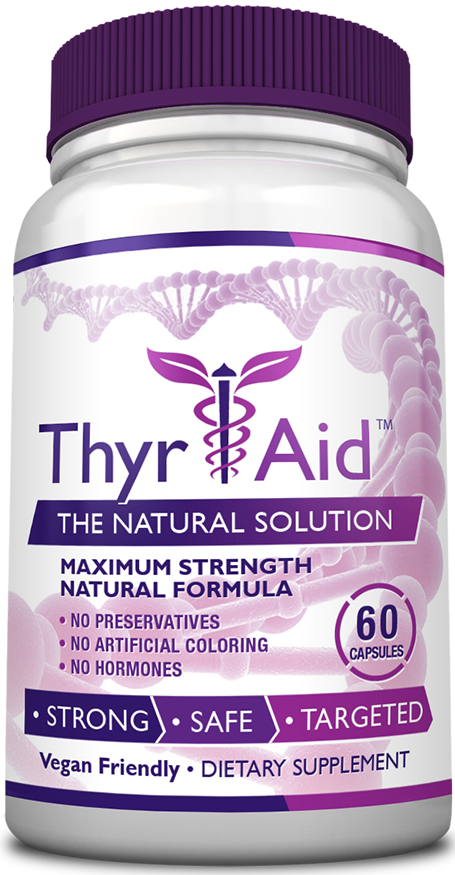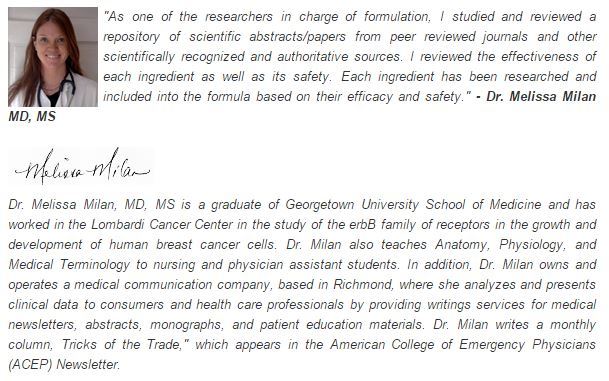What Makes ThyrAid™ Stand Out?

ThyrAid™ is a uniquely formulated proprietary supplement that blends a selection of ingredients that have been extensively studied for their potential to support thyroid health. The formulation of ThyrAid™ was guided by a team of medical doctors and scientific researchers, who carefully selected each ingredient based on available clinical data.
ThyrAid™ contains 16 tested ingredients that meet the strength and purity standards of the USP/NF (United States Pharmacopeia–National Formulary). Each ingredient was included based on thorough research and its alignment with these standards. This focus on quality and purity reflects our dedication to using premium ingredients.
Recommended dose for adults is 2 (two) capsules daily with meals - 1 (one) in the morning and 1 (one) at night as a dietary supplement. This product is intended for general thyroid support and hypothyroidism. It is recommended to consult a healthcare professional if you have hyperthyroidism or have been diagnosed with Graves disease before using this product.
ThyrAid™ is a completely vegan-friendly product. With capsules that are made entirely from vegetable cellulose, this product is 100% vegan friendly.
Click here to see our label.
ThyrAid™ 's Proprietary Blend of Ingredients:
 Iodine is an essential element involved in the production of the thyroid hormones T3 and T4, which play a role in supporting metabolism. Adequate iodine levels are important for maintaining thyroid health. Iodine is particularly valued for its role in supporting normal thyroid function and overall well-being.
Iodine is an essential element involved in the production of the thyroid hormones T3 and T4, which play a role in supporting metabolism. Adequate iodine levels are important for maintaining thyroid health. Iodine is particularly valued for its role in supporting normal thyroid function and overall well-being.
 Kelp is a natural source of vitamins and minerals, including iodine, potassium, magnesium, calcium, and iron. It is particularly valued for its naturally high iodine content, which supports normal thyroid function. Iodine is involved in the production of thyroid hormones, which play a role in energy production and overall development.
Kelp is a natural source of vitamins and minerals, including iodine, potassium, magnesium, calcium, and iron. It is particularly valued for its naturally high iodine content, which supports normal thyroid function. Iodine is involved in the production of thyroid hormones, which play a role in energy production and overall development.
 Selenium is an important mineral that plays a key role in supporting overall thyroid health. It is involved in the body's natural processes, including the conversion of thyroid hormones into their active forms. Selenium is also recognized for its antioxidant properties, which help protect cells from oxidative stress. This mineral is particularly valued in contexts related to thyroid support, especially for individuals managing autoimmune concerns, such as Hashimoto's.
Selenium is an important mineral that plays a key role in supporting overall thyroid health. It is involved in the body's natural processes, including the conversion of thyroid hormones into their active forms. Selenium is also recognized for its antioxidant properties, which help protect cells from oxidative stress. This mineral is particularly valued in contexts related to thyroid support, especially for individuals managing autoimmune concerns, such as Hashimoto's.
Clinical trials have shown that groups taking selenium reported improvements in their mood and well-being, and lab tests found lower levels of the antibodies that attack the thyroid.
 Magnesium deficiency causes a variety of symptoms, but one of the most common is an impaired thyroid gland. Magnesium deficiencies may lead to hypothyroidism, which can then make it hard for your body to lose weight, keep off excess weight, and regulate body temperature. It is believed that the central biochemical event in thyroid disease is that of an "acquired, altered mitochondrial function due to deficiency of magnesium, and selenium". Deficiencies have also been linked to depression, mood swings, and sleep disorders.
Magnesium deficiency causes a variety of symptoms, but one of the most common is an impaired thyroid gland. Magnesium deficiencies may lead to hypothyroidism, which can then make it hard for your body to lose weight, keep off excess weight, and regulate body temperature. It is believed that the central biochemical event in thyroid disease is that of an "acquired, altered mitochondrial function due to deficiency of magnesium, and selenium". Deficiencies have also been linked to depression, mood swings, and sleep disorders.
Studies have shown that hypothyroidism is a known factor for an increased risk of congestive heart failure and that patients with hypothyroidism are less likely to recover. Magnesium deficiencies contribute to this by causing a general weakness in heart condition and lack of blood circulation, as well as reducing thyroid function.
 Vitamin B12 is found in every cell of the body and is required for 'cellular metabolism and energy production, the production and regulation of the DNA and for fatty acid metabolism'. Studies show that many more individuals suffer from vitamin B12 deficiency than was previously believed and because the symptoms of hypothyroidism overlap with those of vitamin B12 deficiency, experts believe there is a link between both deficiency states.
Vitamin B12 is found in every cell of the body and is required for 'cellular metabolism and energy production, the production and regulation of the DNA and for fatty acid metabolism'. Studies show that many more individuals suffer from vitamin B12 deficiency than was previously believed and because the symptoms of hypothyroidism overlap with those of vitamin B12 deficiency, experts believe there is a link between both deficiency states.
A study in Pakistan investigated the co-occurrence of the two deficiencies evaluating the signs and markers of vitamin B12 deficiency in patients suffering from hypothyroidism. The results demonstrate a high prevalence of vitamin B12 deficiency among hypothyroid patients. Another study looked at the link between hypothyroidism and high homocysteine levels. The study involved hypothyroid sufferers who were also diagnosed with hyperhomocysteinemia (high levels of homocysteine). After a few months of treatment with L-thyroxine, the researchers found that the patients' homocysteine levels reduced to normal and their hypothyroidism was resolved. It was concluded that hypothyroidism is a cause of hyperhomocysteinemia and that it is treatable. Vitamin B12 is required to ensure correct synthesis of this process.
 Zinc deficiencies can impair immune response and growth rate. Zinc is required in the conversion process of thyroid hormones, assisting the thyroid gland to transform the inactive hormone T4 into the active hormone T3. Together with signaling the pituitary gland to activate the thyroid, zinc also plays a role in promoting the activity of the thyroid receptors located in the body.
Zinc deficiencies can impair immune response and growth rate. Zinc is required in the conversion process of thyroid hormones, assisting the thyroid gland to transform the inactive hormone T4 into the active hormone T3. Together with signaling the pituitary gland to activate the thyroid, zinc also plays a role in promoting the activity of the thyroid receptors located in the body.
 Copper works with zinc to help produce thyroid hormones. An imbalance of copper and zinc in the body can affect thyroid health. Copper has been shown to possess an essential capacity in thyroid metabolism, principally in thyroid hormone manufacturing and absorption. It actually triggers the production of T4 hormone, while also precluding the blood cells ability to over-absorb T4 by adjusting the body's cell permeability levels. Additionally, copper is essential for the activation of Thyroid Stimulating Hormone (TSH).
Copper works with zinc to help produce thyroid hormones. An imbalance of copper and zinc in the body can affect thyroid health. Copper has been shown to possess an essential capacity in thyroid metabolism, principally in thyroid hormone manufacturing and absorption. It actually triggers the production of T4 hormone, while also precluding the blood cells ability to over-absorb T4 by adjusting the body's cell permeability levels. Additionally, copper is essential for the activation of Thyroid Stimulating Hormone (TSH).
 Manganese has been studied to show its vital role in liver function, fat metabolism, and liver antioxidant status. A lack of manganese is associated with reduced function of thyroid hormone production in the body due to the effect that excessive free radical stress may place upon cell membrane activity in the liver. Manganese, a mineral, is required to produce a special antioxidant enzyme called 'manganese-dependent superoxide dismutase (MnSOD)' which forms an antioxidant defense system that enables the cell to produce energy and heat efficiently. If this enzyme is missing, the activation of thyroid hormones will be affected.
Manganese has been studied to show its vital role in liver function, fat metabolism, and liver antioxidant status. A lack of manganese is associated with reduced function of thyroid hormone production in the body due to the effect that excessive free radical stress may place upon cell membrane activity in the liver. Manganese, a mineral, is required to produce a special antioxidant enzyme called 'manganese-dependent superoxide dismutase (MnSOD)' which forms an antioxidant defense system that enables the cell to produce energy and heat efficiently. If this enzyme is missing, the activation of thyroid hormones will be affected.
 Molybendum is a very important trace mineral which acts as a key component to help the body maintain a proper pH equilibrium. If pH levels are too low, oxygen levels may decrease, which results in lowering metabolism, therefore burning less fat. Molybdenum interacts with enzymatic systems to influence overall well-being and regulate metabolism.
Molybendum is a very important trace mineral which acts as a key component to help the body maintain a proper pH equilibrium. If pH levels are too low, oxygen levels may decrease, which results in lowering metabolism, therefore burning less fat. Molybdenum interacts with enzymatic systems to influence overall well-being and regulate metabolism.
 L-Tyrosine combined with iodine promotes the production of thyroid hormones. Without the presence of tyrosine the thyroid becomes underactive. L-Tyrosine, an amino acid, maintains an active and central role in the manufacturing of thyroid hormones T3 and T4. Active in the metabolic process, L-Tyrosine combines with iodine to synthesize thyroid hormones necessary to effectively transform or metabolize calories from the food we eat into usable energy. Tyrosine also plays an essential part in the production of hormones such as dopamine, serotonin, and norepinephrine which affect mood levels.
L-Tyrosine combined with iodine promotes the production of thyroid hormones. Without the presence of tyrosine the thyroid becomes underactive. L-Tyrosine, an amino acid, maintains an active and central role in the manufacturing of thyroid hormones T3 and T4. Active in the metabolic process, L-Tyrosine combines with iodine to synthesize thyroid hormones necessary to effectively transform or metabolize calories from the food we eat into usable energy. Tyrosine also plays an essential part in the production of hormones such as dopamine, serotonin, and norepinephrine which affect mood levels.
 Schisandra is a versatile herb traditionally used in various herbal practices. It is known for its adaptogenic properties, supporting the body during times of environmental, physical, or mental stress. Schisandra berries are recognized for their antioxidant content, which helps protect cells from oxidative stress caused by free radicals and other environmental factors.
Schisandra is a versatile herb traditionally used in various herbal practices. It is known for its adaptogenic properties, supporting the body during times of environmental, physical, or mental stress. Schisandra berries are recognized for their antioxidant content, which helps protect cells from oxidative stress caused by free radicals and other environmental factors.
 Ashwaghnada (Withania somnifera) is an Ayurvedic herb that has been valued for thousands of years in traditional practices. Known for its adaptogenic properties, ashwagandha is often used to help the body manage stress and support overall vitality. This herb is recognized for its role in supporting the endocrine system and maintaining a sense of balance within the body.
Ashwaghnada (Withania somnifera) is an Ayurvedic herb that has been valued for thousands of years in traditional practices. Known for its adaptogenic properties, ashwagandha is often used to help the body manage stress and support overall vitality. This herb is recognized for its role in supporting the endocrine system and maintaining a sense of balance within the body.
 Bladderwrack (Fucus vesiculosus) is a type of seaweed traditionally used in herbal practices, particularly for its association with thyroid health. It has been commonly used by those seeking to support normal thyroid function, especially in cases of hypothyroidism. Bladderwrack is valued for its potential to help maintain overall thyroid balance.
Bladderwrack (Fucus vesiculosus) is a type of seaweed traditionally used in herbal practices, particularly for its association with thyroid health. It has been commonly used by those seeking to support normal thyroid function, especially in cases of hypothyroidism. Bladderwrack is valued for its potential to help maintain overall thyroid balance.
 Gotu Kola, Coleus forskholii & Gugulipids are herbs traditionally used in various practices related to thyroid health. Gotu Kola is known for its role in supporting the hormone and nervous systems, contributing to energy and vitality. Coleus forskohlii has been studied for its potential to support thyroid function and is commonly associated with managing weight. Gugulipids are herbal extracts derived from the gum resin of the Commiphora mukul tree, which is native to northern India. This herb is recognized for its antioxidant, anti-inflammatory, and immune-supporting properties.
Gotu Kola, Coleus forskholii & Gugulipids are herbs traditionally used in various practices related to thyroid health. Gotu Kola is known for its role in supporting the hormone and nervous systems, contributing to energy and vitality. Coleus forskohlii has been studied for its potential to support thyroid function and is commonly associated with managing weight. Gugulipids are herbal extracts derived from the gum resin of the Commiphora mukul tree, which is native to northern India. This herb is recognized for its antioxidant, anti-inflammatory, and immune-supporting properties.






 ThyrAid™'s formulation of effective ingredients and strong name recognition have brought praise from both customers and health professionals alike. To learn more about the research and data behind ThyrAid™ , please visit our "
ThyrAid™'s formulation of effective ingredients and strong name recognition have brought praise from both customers and health professionals alike. To learn more about the research and data behind ThyrAid™ , please visit our "




